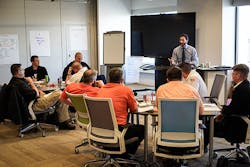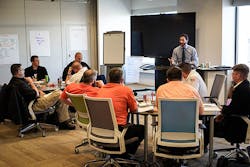Contractors looking for improved results need to take action
Reflect on this very true statement: no result has ever occurred without an action; no thought, idea or intention has ever created a result without a corresponding and specific action.
Training, which is intended to improve results, is thought — and idea — laden in most companies, with almost no action being incorporated.
More progressive contractors may make an effort to change their training environment. These shops have embraced the value of role playing. It’s often in the form of two technicians at the front of the room, awkwardly, uncomfortably and terrifyingly navigating through a mock service call.
The “customer,” not missing his chance to be difficult, throws the technician a curve ball to draw the laughter and ridicule of the team. At best, the technician gets through this painful experience and is offered feedback from the team, leaving him more dismantled then emboldened.
If either of these scenarios hits too close to home, don’t beat yourself up. We’re all just doing the best we can with the information we have. So here’s some new information on role playing for your consideration.
Ultimately, the challenge is to create an environment that stretches and challenges people, yet encourages them and strengthens their long-term performance. Continue reading for some tips and adjustments you can make to change the results of your training.
Skill practice
The power of “skill practice” is undeniable. First, note that we intentionally navigate away from the term “role play,” which has all types of weird and painful connotations. Skill practice is very much the action that leads to different results. But it should rarely be done in front of a room of peers and critics. Most managers and owners engage in this practice in order to monitor the quality of the work being done, but underestimate the amount of pressure participants experience in this performance style of training.
The art of improvement: Video training can help make contractors better
What we’ve found through our participant-centered approach to training is that by bestowing trust in participants to train each other, we create an environment of accountability and success unlike what we’ve seen in traditional role playing.
Pair training participants randomly with someone from a different department or with less of a prior day-to-day relationship, and create “learning partners.” As you direct skill practice, let participants know their learning partners will be the only persons who will see them practice and perform their skills. As you take this pressure off, you’ll quickly see an increased willingness to actually participate.
Resistance, humor
Next, realize you will still see resistance to skill practice. It’s only natural. Why? Because we’re asking grown men and women to run pretend calls with fake customers in a warehouse or meeting room somewhere. It’s absurd! Acknowledge the activity as such to take the edge off. The moment they discover they can laugh with you, your employees will develop a whole new perspective.
But let’s not lose the precision of the practice. So start this culture change by asking the group what the benefits will be of practicing their craft in this environment. Allow a group discussion to ensure your employees actually own the benefits of the practice, and they’ll be much less resistant to participating in them.
They’ve got rhythm
If you go into any tightly seated restaurant you’ll notice a common characteristic — music. It’s often quiet and nearly imperceptible, but what music does is create insulation to those quiet conversations. White noise is a powerful safety net for people to speak without feeling everyone else is listening to their conversation. To that point, don’t listen to their conversations! Most trainers and owners can’t stand the idea of giving up this power. “But what if they’re doing it wrong? How will we know? How will we correct it?” Trust your team and they’ll trust the training process.
What’s in it for others?
“What’s in it for me?” (WIIFM) is one of the most antiquated sales and business acronym, and one I am tired of seeing and hearing. It states that as humans we are so selfish we won’t do anything that doesn’t directly benefit us in that very moment. The world is full of people who dedicate their lives to others’ well-being. Yet we look at our own team as though they live minute to minute with the meter running. We have to pay them for every effort or worse yet, threaten them for lack of effort.
I’ve learned one really powerful commonality among the thousands of technicians I’ve trained — they’re humans. And great ones at that! For years when we would assign learning partners we struggled with one recurring complaint “my learning partner isn’t really into this.” Then we as trainers would step in and thereby derail the idea of them being responsible for their own work. Until one adjustment changed everything.
We asked participants to evaluate their performance on how well their learning partner is doing rather than on their own your work. We challenged them to be a coaches and motivational influences on their partners. One of the most critical elements of humanity is to know we are significant. The promise of being significant in someone’s life motivates people as much as any incentive I’ve ever seen.
When we ask people to become responsible for each other, it shifts the pressure from being self-centered and moves the focus to the other person. Not only does this create an incredible culture, but the research also backs it up. When an individual is asked to teach critical content, he or she retains 90% of the information, as opposed to merely 10% from lecture. If your team becomes focused on everyone else getting it, then everyone has to get it.
Results have never occurred without action. By creating a training environment in your company that fosters actions, you will create results. Take a good look at your team, your training and your results. If they’re not what you dream of, there’s only one person who can take different actions the action to get there.
Keith Mercurio is the training manager for Nexstar Network, responsible for training members on sales, customer service and motivation in the field.

